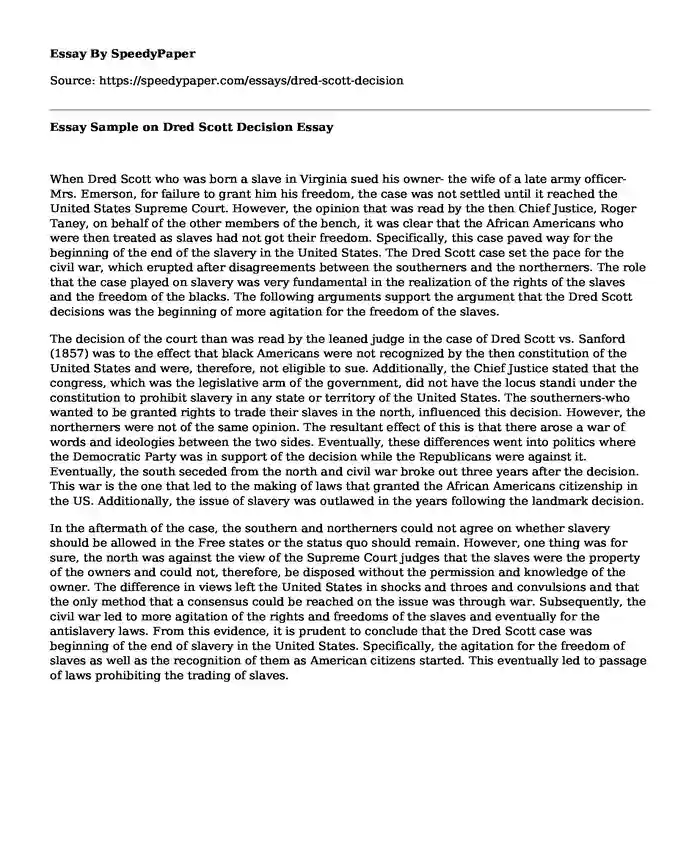When Dred Scott who was born a slave in Virginia sued his owner- the wife of a late army officer- Mrs. Emerson, for failure to grant him his freedom, the case was not settled until it reached the United States Supreme Court. However, the opinion that was read by the then Chief Justice, Roger Taney, on behalf of the other members of the bench, it was clear that the African Americans who were then treated as slaves had not got their freedom. Specifically, this case paved way for the beginning of the end of the slavery in the United States. The Dred Scott case set the pace for the civil war, which erupted after disagreements between the southerners and the northerners. The role that the case played on slavery was very fundamental in the realization of the rights of the slaves and the freedom of the blacks. The following arguments support the argument that the Dred Scott decisions was the beginning of more agitation for the freedom of the slaves.
The decision of the court than was read by the leaned judge in the case of Dred Scott vs. Sanford (1857) was to the effect that black Americans were not recognized by the then constitution of the United States and were, therefore, not eligible to sue. Additionally, the Chief Justice stated that the congress, which was the legislative arm of the government, did not have the locus standi under the constitution to prohibit slavery in any state or territory of the United States. The southerners-who wanted to be granted rights to trade their slaves in the north, influenced this decision. However, the northerners were not of the same opinion. The resultant effect of this is that there arose a war of words and ideologies between the two sides. Eventually, these differences went into politics where the Democratic Party was in support of the decision while the Republicans were against it. Eventually, the south seceded from the north and civil war broke out three years after the decision. This war is the one that led to the making of laws that granted the African Americans citizenship in the US. Additionally, the issue of slavery was outlawed in the years following the landmark decision.
In the aftermath of the case, the southern and northerners could not agree on whether slavery should be allowed in the Free states or the status quo should remain. However, one thing was for sure, the north was against the view of the Supreme Court judges that the slaves were the property of the owners and could not, therefore, be disposed without the permission and knowledge of the owner. The difference in views left the United States in shocks and throes and convulsions and that the only method that a consensus could be reached on the issue was through war. Subsequently, the civil war led to more agitation of the rights and freedoms of the slaves and eventually for the antislavery laws. From this evidence, it is prudent to conclude that the Dred Scott case was beginning of the end of slavery in the United States. Specifically, the agitation for the freedom of slaves as well as the recognition of them as American citizens started. This eventually led to passage of laws prohibiting the trading of slaves.
Cite this page
Essay Sample on Dred Scott Decision. (2019, Sep 17). Retrieved from https://speedypaper.net/essays/dred-scott-decision
Request Removal
If you are the original author of this essay and no longer wish to have it published on the SpeedyPaper website, please click below to request its removal:
- Why Do Startups Fail? Essay Sample on Business Incubators
- Project Failure Reflection Blog. IT Essay Example.
- Text Analysis of Hamlet by William Shakespeare: Essay Sample
- US Histoty Essay Sample: 19th-century Housing Reforms. Strengths and Weaknesses of Progressivism.
- Free Essay Sample on Human Resource Trend
- Health Promotion Essay Example: Healthy Aging
- What is the Public Choice of Idea or Theory? Paper Example
Popular categories





